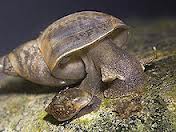In vivo phytotherapy of snail by plant derived active components in control of fascioliasis
Keywords:
Lymnaea acuminate, Redia, Cercaria, Plant derived larvicidal, PhytotherapyAbstract
Fascioliasis is worldwide zoonotic disease, which caused great economic loss to human being. In vivo killing of Fasciola larva (redia and cercaria) is one of the effective methods to control of fascioliasis. In vivo toxicity of different binary combinations (1:1ratio) of plant derived active components such as citral, ferulic acid, umbelliferone; azadirachtin and allicin were tested against Fasciola larva (redia and cercaria) in snail Lymnaea acuminata. Mortality of larvae were observed at 2h, 4h, 6h and 8h of treatment. In vivo exposure of azadirachtin + allicin (1:1 ratio) was highly toxic against redia and cercaria (8h LC50 0.007and 0.006 mg/L). Combinations of citral + umbelliferone, cirtal + ferulic acid were less toxicity against redia and cercaria larva than azadirachtin + allicin. In vivo use of these larvicidal active components in the binary combinations at sublethal does will be more helpful in controlling the redia/cercaria than their individual components.References
Adewunmi, C.O., Oguntimein, B.O., Furu, P., 1990. Molluscicidal and antischistosomal activities of Zingiber
officinale. Planta Medica, 56(4), 374- 376.
Agarwal, R.A., Singh, D.K., 1988. Harmful Gastropods and their control. Acta Hydrochim Hydrobiol, 16, 113-138.
Assis, L.M., Bevilequa, C.M.L., Morais, S.M., Vieira, L.S., Costa, C.T.C., Souza, J.A.L., 2003. Ovicidal and larvicidal
activity in vitro of Spieled anthelia Linn. Extract on Haemonchus contorlus. Veterinary Parasitology, 117, 43-
Datta, A., Sukul, N.C., 1987. Antifilarial effect of Zingiber officinale on Dirofilaria immitis. Journal of Helminthology,
, 255-258.
Eigner, D., Scholz, D., 1999. Ferula asafoetida and Curcuma longa in traditional treatment and diet in Nepal.
Journal of Ethnopharmacology, 67, 1-6.
Fatehi, M., Farifteh, F., Hassanabad, Z.F., 2004. Antispasmodic and hypotensive effect Ferula asafoetida gum
extract. Journal of Ethnopharmacology, 91, 321-324.
Goto, C., Kasuya, S., Koga, K., Ohtomo, H., Kaget, N., 1990. Lethal efficacy of extract from Zingiber officinale
(traditional Chinese medicine) or [6]-shogaol and [6]-gingerol in Anisakis larvae in vitro. Parasitology
Research, 76, 653- 656.
Hoppe, H.A., 1975. Drogenkunde, vol. I .Angiosperms. 8thEd, Walter De Gruyter, Berlin.
Jaiswal, P., Singh, D.K., 2009. Molluscicidal activity of Nutmeg and Mace (Myristica fragrans Houtt.) against the
vector snail Lymnaea acuminata. Journal of Herbs, spices and medicinal plants, 15, 177-186.
Kalesaraj, R., 1974. Screening of some indigenous plants for anthelmintic action against human Ascaris
lumbricoides. Indian J. Physiol. Pharmacol, 18: 129-31.
Kalesaraj, R., 1975. Screening of some indigenous plants for anthelmintic action against human Ascaris
lumbricoides. Part II Indian J. Physiol. Pharmacol, 19, 47-9.
Kirtikar, K.R., Basu, B.D., 1981. Indian medicinal Plants. Part II, Indian Press.
Kumar, P., Singh, D.K., 2006. Molluscicidal activity of Ferula asafoetida, Syzygium aromaticum and Carum carvi and
their active components against the snail Lymnaea acuminata. Chemosphere, 63, 1568-1574.
Kumar, P., Singh, V.K., Singh, D.K., 2009. Kinetics of enzyme inhibition by active molluscicidal agent ferulic acid,
umbelliferone, eugenol and limonene in the nervous tissues of snail Lymnaea acuminata. Phytotherapy
Research, 23 (2), 172 -177.
Kumar, P., Singh. V.K., Singh, D.K., 2011. Bait formulations of molluscicides and their effects on biochemical
changes in the ovotestis of snail Lymnaea acuminata (Mollusca; Gastropoda:Lymneidae). Rev. Inst. Med.
Trop. Sao. Paulo, 53 (5), 271-275.
Mas-Coma, S., Bargues, M.D., Valero, M. A., 2005. Fascioliasis and other plant borne trematode Zoonoses.
International Journal of Parasitology, 35, 1255-1278.
Mas-Coma, S., Valero, M.A., Bargues, M. D., 2009. Fasciola, Lymnaeids and human fascioliasis with a global
overview on disease transmission, Epidemiology, evolutionary genetics. Molecular Epidemiology and control,
In David Rollinson and Simon Iain Hay, Editors. Advances in Parasitology, Burlington: Academic Press, 69, 41-
Nadkarni, K.M., 1976. Indian Materia Medica. Vol I and II Popular Prakashan. Private Limited Bombay, India
Robertson, J.L., Russell, R.M., Preciter, H.K., Savin, N.E., 2007. Bioassay with arthropods data, 2nd Eds Taylar and
Francis, CRC Press, 1-224.
Saleem, M., Alam, A., Sultana, S., 2001. Asafoetida inhibits early events of carcinogenesis-a Chemopreventive
study. Journal of Life Science, 68, 1913-1921.
Singh, K., Singh, A., Singh, D.K., 1995. Molluscicides activity of different combination of the plant products used in
the molluscicides Pestoban. Biological Agriculture Horticulture, 12, 253-261.
Singh, O., Agarwal, R. A., 1981. Toxicity of certain pesticides to two economic species of snail in northern India.
Journal of Economic Entomology, 74, 568-571.
Singh, S., Singh, V.K., Singh, D.K., 1997. Molluscicidal activity of some common spice plants. Biological Agriculture
Horticulture, 14, 237- 249.
Singh, V.K., Singh, D.K., 1995. Characterization of allicin as a molluscicidal agent in Allium sativum (garlic). Biological
Agriculture Horticulture, 12, 119-131.
Sokal, R.R., Rohlf, F.J., 1996. Introduction of biostatistics, W.H. Freeman, San Francisco, Co, USA.
Srivastava, A.K., Singh, D.K., Singh, V.K., 2013. Abiotic factors and anti-reproductive action of bait containing
eugenol against Lymnaea acuminata. Scientific Journal of Biology Science, 2(4), 76-85.
Steenis-Kruseman, M.J.V., 1953. Select Indonesian medicinal plants organize. Science Research Indonesia Bulletin,
: 31.
Sunita, K., Singh, D.K., 2011. Fascioliasis control: In vivo and in vitro phytotherapy of vector snail to kill Fasciola
larva. Journal of parasitology research, 2011, 1-7.

Published
How to Cite
Issue
Section
Copyright (c) 2013 Kumari Sunita, Pradeep Kumar, D. K. Singh

This work is licensed under a Creative Commons Attribution-NonCommercial-NoDerivatives 4.0 International License.



